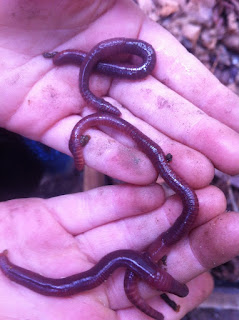I first posted on our efforts of finding wild red wrigglers and the box I built to house them in on October 2, 2016. I left the box with the worms inside outside by the woodshed for the winter and hoped for the best. It was a cold winter and at times I wondered how the 140 plus worms we had found were doing. I waited until early spring before looking inside. When I lifted off the lid and smelled the rich aroma of earth I knew that the worms were doing fine. I left them with a large bucket of kitchen scraps and a small pail of cut up, soaked recycled paper. Apparently there are 700 - 800 breeding worms in a pound. (Breeding worms are the big ones with bands around them- they are in the picture.) I saw lots of breeding worms in our box - far more than what we had found last fall to put in. To me there is something incredibly beautiful about the sensuous rawness of nature's rhythms.
Sent from my iPhone

That is amazing. What are you going to do with them, Ronda? Are you using them for soil enrichment? That is really interesting and I am glad they survived the winter. xoDiana
ReplyDeleteHi Diana I guess at this point it is more for my daughter than anything else. Apparently though worm castings are excellent for transplanting plants.
DeleteSo exciting! Did you find your original worms in the forest? As I understand, they are not the type that occur naturally in my suburban garden soil. If I raise worms (and I would like to), they will not be the kind that I can add to my soil, but their castings can be used as soil enrichment. Is this right?
ReplyDeleteYes the original worms are native to this island. Yes, that is correct - if you raise hybrid worms which are bred to breed fast but are non-native than you should isolate them from your soil. Some people wouldn't - but I would.
DeleteI just thought that the non-native worms would die if you put them in your soil...
DeleteIf there isn't anything there for them on the surface of the soul ie compost to eat that is correct they will die. Hope that helps. Thanks for your questions! Ronda
DeleteHow awesome that they made it through the winter, plus multiplied! Thank you Lord for blessing Ronda in this way! Hugs to you today :)
ReplyDeleteSturdy little fellows! ;) We have a pond full of goldfish. I always marvel how they make it through the winter, under the ice and snow...just like your red wrigglers!
ReplyDeleteMy husband can handle worms since he likes to go fishing. I must say that I prefer not to handle them. Of course I see how necessary they are to our ecosystem, to our lives in many ways and thus they are precious to us all. :)
ReplyDelete